Share this article
Wildlife Vocalizations: Megan Helsel
Wildlife Vocalizations is a collection of short personal perspectives from people in the field of wildlife sciences.
The biggest lesson that life has taught me is that “if it doesn’t challenge you, it doesn’t change you.”
I began working for USDA Wildlife Services as a field technician in 2015 and quickly learned how challenging the wildlife field can be. Over the following years, I adjusted to the physical challenges that come along with working in the field and settled into various positions.

A drone photograph taken while conducting a bird survey in New Jersey wetlands.
Credit: Megan Helsel
Then, in October 2018, I became paralyzed from the waist down over the course of a week. I learned after going to the emergency room that I had a tumor inside my spine, that it had ruptured, and I would need emergency spinal cord surgery. My first question was “when will I be able to kayak again?” because all I could think about was getting back to work and doing what I loved. I was told that I’d never walk again. Mentally, I wasn’t ready to give up and was ready to push myself physically to do whatever I needed to do in order to be able to return to field work. Six months later, I defied the odds and returned to work.

A snowy owl to be banded and relocated away from the airport.
Credit: Stefan Guelly
I was still partially paralyzed, with only one leg functioning close to “normal” and my other leg in a brace from my hip down to my foot. I needed to use two canes to walk. I thought I had gotten through the hardest part of the journey by getting back to work, but the challenges were just about to start.
There is no handbook for being disabled in a field position and not a lot of modifications that can be made without having full use of your legs. I had to think outside of the box to come up with creative ways to do every aspect of my job. For example, my position involves a lot of kayaking, but at first I couldn’t carry the kayak. I had to put it on a cart, tie a ratchet strap from the cart to my waist, and pull it to the water. Now, as I’ve gotten stronger, I am able to carry it again. Another challenge is carrying bags of corn when I am baiting for projects because I need my hands to use canes. I learned to carry the bags of corn in a backpack to complete the task.
\

Outside of work, most of Helsel’s free time is spent outdoors fishing, kayaking and hiking. Credit: Rob Jasonek
If you asked me four years ago if I thought I’d be where I am now, I would have said there was no way it was possible. I joke that working for Wildlife Services is “spinal cord injury bootcamp,” but I don’t think I would have had the same physical gains if I had not returned to work. Every year, new projects come up that I need to think of creative modifications for, but I have become physically, and mentally stronger with each one. The challenges that I have faced because of my spinal cord injury have been the greatest challenges of my life, but I would not change any of it because they have changed me into a stronger person than I ever thought was possible.
Learn more about Wildlife Vocalizations, and read other contributions.
Submit your story for Wildlife Vocalizations or share the submission form with your peers and colleagues to encourage them to share their story.
For questions, please contact Jamila Blake.
Header Image: A trail camera photograph taken while baiting for a deer population study. Credit: Megan Helsel








